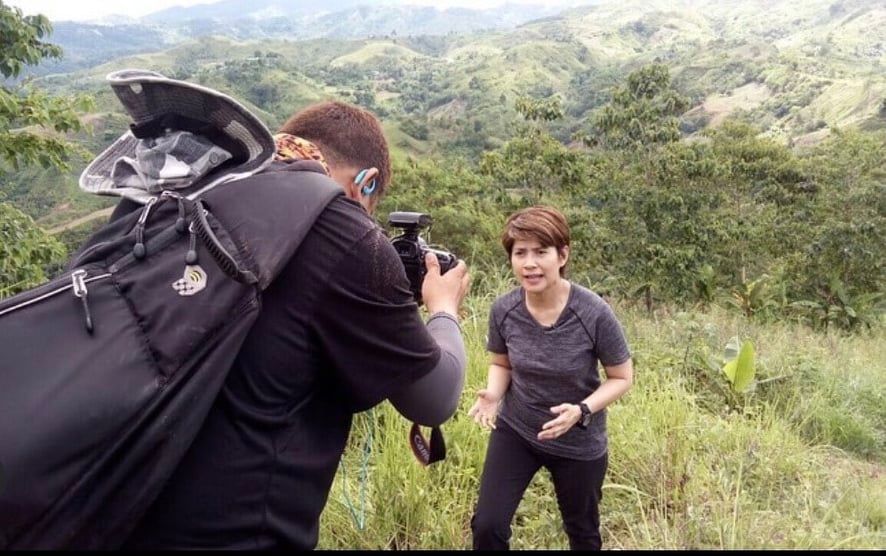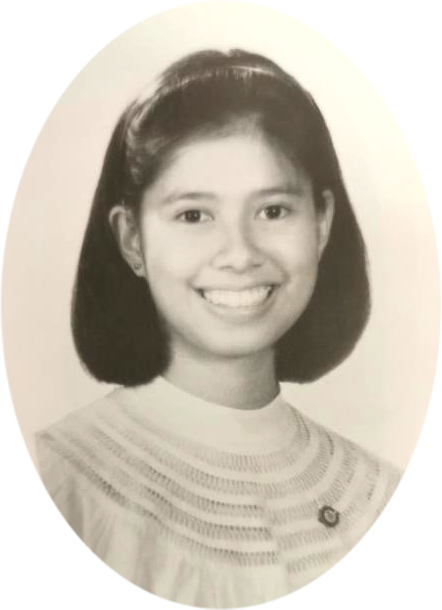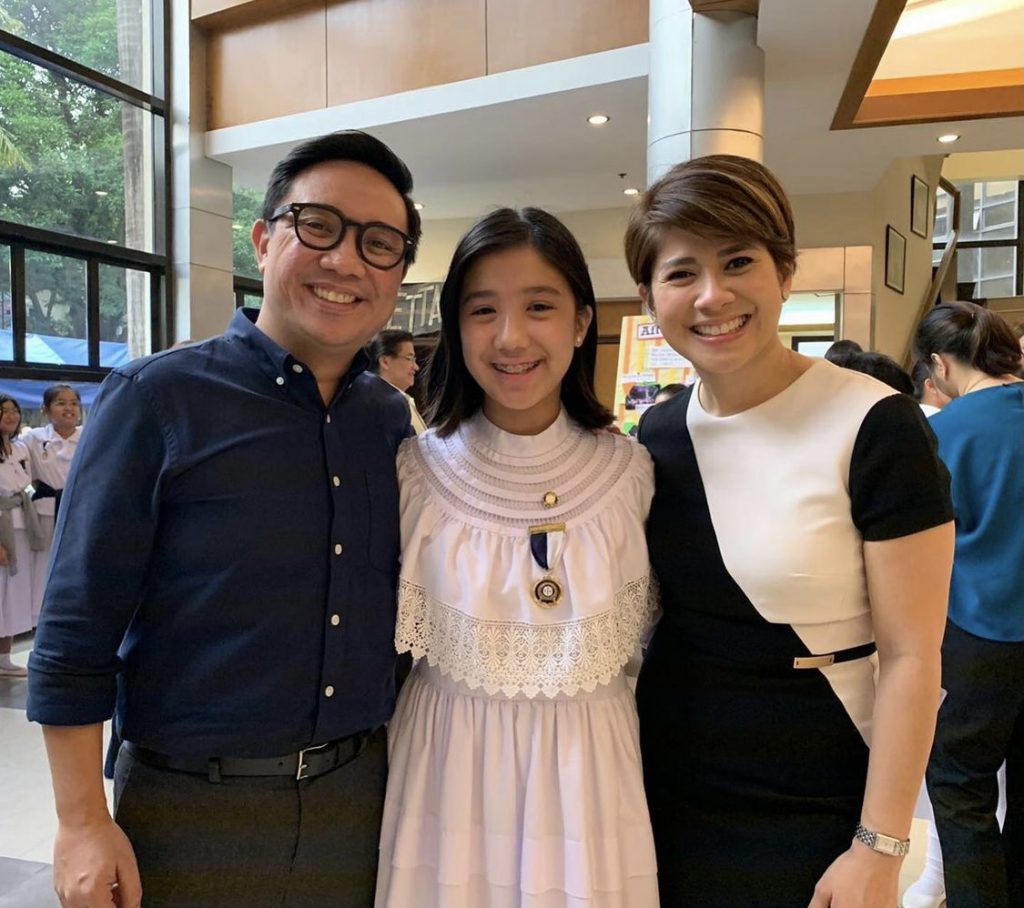ALUMNA IN FOCUS: PIA HALILI ACHS 1996
by Carmella Gana – Araullo

From court side reporter, to hosting Art Angel, 100% Pinoy, Unang Hirit and Tunay na Buhay, to field correspondent for GMA news to becoming a full blown anchor for 24 Oras weekend (GMA) and Saksi (GMA), her Curriculum Vitae is surely very impressive.
What’s more impressive is that she graduated with the Marie Eugenie Award, Award for Leadership and got an Alfonso Yuchengco Award for National Discipline. A great example of what an Assumption education and MME devotee can accomplish in the field of journalism, meet Maria Pia Concepcion Arcangel Halili, ACHS Batch 1996. She embodies her own adage “To live life simply and inspiring others to do the same”.
Q: Where did you go to college and what was your degree?
A: I took up AB Communications at the Ateneo de Manila and graduated in 2000.
Q: What were you doing before you began in media?
A; My first job was with the media, but there was a time when I took on a corporate job and worked in an ad agency for (a grand total of … ) 2 months before joining the broadcast industry full-time. It was a short-lived office stint hehe.
Q: How did you begin your career in Media? Or What made you choose Journalism as a career?
A: My first TV job was with Studio 23, as a courtside reporter for Ateneo in the UAAP – I applied for the job as a fresh grad and covered the Ateneo Blue Eagles for one season, then transferred to the now-defunct Metropolitan Basketball Association (MBA) and later on, the Philippine Basketball Association (PBA).
After two years of covering sports, I worked briefly as a weather girl and segment host on ANC, before eventually moving to GMA-7 where I continue to work as a news anchor and correspondent.
Q: What Is your favorite part of being in Media?
A: I think one of the best parts of working in media is that I get a front-seat to history – journalists get to watch up close as history unfolds, and more importantly, we have the opportunity to share our stories with so many others.

Q: What is the most challenging aspect of your job?
A: Like with most other jobs, I think the most challenging aspect to ours is learning to adapt, and doing it as quickly as possible. When I first started covering the news, we were reporting for a maximum of 3 newscasts a day. These days, aside from the newscasts, we are also reporting on social media platforms, and we have to get our stories out as quickly as possible, without sacrificing the accuracy of each report.
Q: What has been the most rewarding aspect of being in media?
A: For me, the most rewarding aspect of being in media is being able to make a positive impact on other people’s lives by sharing their stories and inspiring others to do the same. When we are able to share stories that bring about positive change, then I think we are doing our jobs effectively.
Q: With your exposure to current nationwide news, what would you consider our country’s most pressing issues? And how can journalism help in bringing recognition of the issue/s and finding solutions for them?
A: I think poverty remains a key issue in our country today – it is directly connected to other issues like health, education and politics. As journalists, it is important for us to be able to fairly present stories highlighting the plight of Filipinos, to help leaders and stakeholders identify their needs and institutionalize the necessary changes to improve their situations.
Q: With the avalanche of fake news, how do you ensure the integrity of what you report as a journalist?
A: It’s important to cross-check each and every fact presented, because every story has an impact. As journalists, we have the responsibility of doing sufficient research and getting all sides of every story – we have to highlight sources, provide context and background information to ensure that what we put out there is truthful and accurate.
Q: What were the biggest news stories you covered? How did they affect you and how do you think they affected our lives as Filipinos?
A: Right before the pandemic hit, I had the chance to visit a small community up in the mountains of Davao de Oro. We shared the story of how the children in the community, some as young as 4-5 years old, would walk across 4 mountains and cross a river just to get to school and do it all over again on their way back home. After airing the story, some private individuals offered to help the community in different ways and their help will hopefully pave the way for the building of a much nearer school for them. I hope this story continues to inspire others to help improve the quality of education for young people.
One big story that I covered which had a profound personal effect on me was the funeral of then-Pope John Paul II. It was the first time I was assigned to cover an international story, and to be doing so at the seat of the Catholic church, was extra meaningful. While covering the event, I was absorbing everything that was happening around me on a deeply personal level,


Q: What have been the biggest challenges in your career and how did you overcome them?
A: Same as with most other women in various fields – one of the biggest challenges I’ve faced is trying to balance career and family. I am devoted to my family and at the same time, I have such passion for my work. Prayers and a strong support system are the biggest help!
Q: How do you think your Assumption education has helped you in the different aspects of your life?
A: Assumption has taught me the core values of faith and action, and the importance of commitment and excellence in what we do. As a journalist, this means promoting fairness and accuracy. As a wife and mother, it means raising a God-centered family. As a woman, this means trusting God in everything.
Q: How did your AC education prepare you for a career that is very much in the public eye?
A: I like to go back to the principles of fidelity to duty and simplicity that I learned in Assumption – it reminds me that my work is a public service and to live simply is to inspire others to do the same.
Q: What is the most important lesson you learned from AC?
A: Live a life of faith and action, according to God’s plan.
Q: What is your best memory of your time in AC?
A: Oooh – so many! But one that stands out is going to Enchanted Kingdom for our field trip when we were in 4th year HS. Enchanted Kingdom had just opened, and we had the best time trying out all the rides and taking pictures – it felt like the entire batch had gone on vacation to Disneyland together.

Q: Who are the women you look up to?
A: My mom, definitely. Her faith and unwavering devotion to her family, alongside her commitment to her career in the academe, are all great examples to live by — for me and for my daughter.
Q: What of SME’s life, teachings, etc. served as an inspiration for you in the way you live, relate with others, make your choices?
A: You know how it is — when all the major decisions that have to be made in life seem to come right after high school? That was what it felt like for me. Less than a year after graduating from AC, I was questioning my college course, the career I thought I was headed for, and so many other little things. Also — boys were all of a sudden such a big part of the picture and the social landscape seemed so different and complicated compared to HS. Admittedly, I was overwhelmed by the different situations I found myself in. Whenever I had doubts about my decisions or actions, I would confide in my friends. Throughout our college years, they would teasingly ask me, “what would MME say?” or “what would MME think of what you did?” and I would always just laugh it off and leave the question unanswered. But what started out as a teasing joke — eventually became a point of reflection for me.
When I first started working as a journalist, I wasn’t sure if I was capable of fully committing to it while trying to raise a family of my own. There were many instances when I thought I wouldn’t be able to do both. In the process of discernment, I went back to the example of SME’s life — which was lived as “a constant YES to God.” I realized that raising a family and having a career weren’t mutually exclusive and that doing both would be my own “yes” to God.
So while there is no singular or straight path for every person, a life lived in faith and commitment to God will help us navigate the tricky parts. It isn’t always easy and it can be overwhelming at times — but then again, as SME also says, “love never says I have done enough” so we keep on going anyway.

Q: What learning from MME do you apply most in the course of your daily life?
In your perspective, has Assumption education changed between then (when you studied) and now? In what ways has it changed?
A: Whether I’m in a tough or happy situation – I like remembering what SME said, that “love never says I have done enough.” This helps me power through frustrating moments, and inspires me even more during grace-filled moments.
Q: What would you say to AC students now about being in media?
A: I think that journalism is essentially a form of public service – we aim to tell stories that will institutionalize positive changes in society.
Q: As a journalist and Assumptionist, what do you think you can contribute towards the achievement of a better Philippine society?
A: As a journalist, I hope to bring to light stories that effect change and inspire goodness. As an Assumptionist, I hope to inspire faith and action in others.
Hope you enjoyed getting to know more about Pia as much as I have. She has fulfilled her passion and stayed true to her motto that was written in her yearbook “Be not afraid” and conquered her own little niche in the world.
